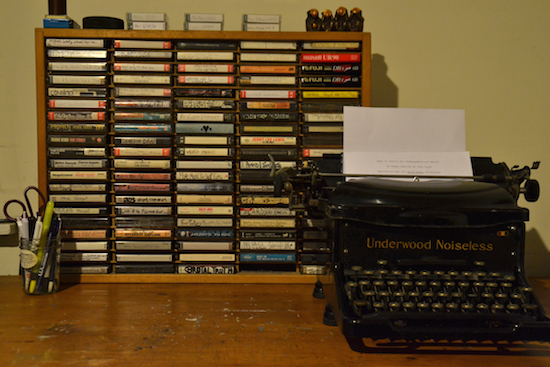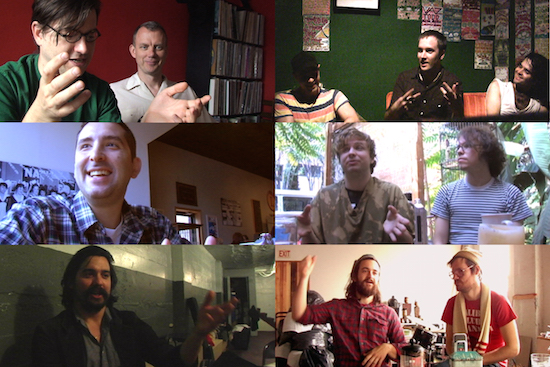TW Theme Feature by John Vogel
Motivation and the Weird Music Interviews

Like most artists, I struggle with making money. I've held editorial positions at small magazines, written freelance, and played in multiple bands, but none of these creative endeavors has provided me with a sustainable income. To pay my bills, I've worked part-time at a University of Pennsylvania linguistics research facility while intermittently teaching keyboard and stocking beer.
Still, working multiple jobs has left me constantly behind and trying to catch up. I’ve often wondered what keeps other musicians, writers, and visual artists going, especially those who aren’t out to make a hit record or write a bestseller. Even eleven years out of college, I couldn’t trade in my creative life; it’s often the carrot on the stick at the end of my day, my personal reward for fulfilling other obligations. Currently, I play in the orchestral-pop band Grandchildren, based in Philadelphia.
Five years ago, I began collecting interviews with various artists about creative motivation. This personal project has become a multimedia collage piece called Weird Music that includes text, music, and many televisions.
One question I asked everyone is how he balanced creative pursuits with making ends meet. When it comes to the underground music scene, it’s ironic that some musicians I talked with used writing to support themselves—at least those who could find paying magazine work or teaching jobs. For this TW feature, I’ve combined responses to the “money” question from the following interviews:
- On August 9, 2009, I conducted the first Weird Music interview with Martin “M.C.” Schmidt and Drew Daniel of the electronic duo Matmos. In addition to the eight albums Matmos has released, they contributed to Björk's Verspertine and Medulla and accompanied her on tour. The interview took place at their home in Baltimore. (Drew Daniel is a Johns Hopkins English professor by day.)
- In June 2010, Brooklyn's electronic-noise percussion ensemble Aa (pronounced “Big A, Little a”) played at Philadelphia's Danger Danger Gallery. After their performance, I interviewed Aa members Josh Bonati, John Atkinson, and Aron Wahl. All three have other day jobs and are now split between California and New York, but they’re still musically active.
- During a Grandchildren tour in October 2010, I snuck away in Chicago to interview writer Joe Meno at a coffee shop. Meno's books include Hairstyles of the Damned (2004) and The Great Perhaps (2009); he teaches fiction writing at Columbia College Chicago.
- A couple of weeks later in the tour, I interviewed Steve Touchstone and Vice Cooler from XBXRX at Touchstone's house in Los Angeles. XBXRX is a noisy, abrasive rock/punk band; originally from Mobile, Alabama, they relocated to California in 2003.
- In Fall 2011, Grandchildren went on another tour, opening for Man Man, an experimental rock band from Philadelphia. I sat down with Ryan Kattner (aka Honus Honus) back stage before our last show in L.A. I also did paired interview sessions with the rest of the band members after returning home to Philly. Matt Gibson and Billy Dufala were part of the group during our tour, but have since left Man Man. Gibson is now focusing on his previous band, The Extraordinaires, while working by day at a moving company. Dufala is dedicated to his sculpture work with his brother Steven.

Excerpts from these interviews have been edited to form the Q&A below. It was not a single conversation, of course, but in many ways, these creative artists—and all those like them—have this kind of conversation every day. Here’s a chance to listen in.
Q: How do you balance creative output and financial income? Do you make your living from your art, or do you have another job to make money?
Vice Cooler: [laughing] Well, writing was one thing for awhile. I was writing or doing photography. I was touring—touring was a main income for me for years. But when you’re working a lot and you’re not as worried about it, money always goes back to zero. At the end of almost every month, I’m still panicking: “Fuck, I gotta pay this bill, I don’t have the money.”
Matt Gibson: It’s a weird balancing act. I want to be a musical artist and performer: How do I do that? I need to spend as much time as possible practicing, creating, and recording or playing or meeting with other musicians. And having any job that’s not involved in that, especially one that’s just straight up lifting heavy shit all day—you can spend the entire day just wishing you were home playing music. But if you’re at home playing music, you’re not paying rent.
John Atkinson: I think we’re all ‘90s babies. I grew up with the idea that, whenever I hear a song on a commercial or see some band is sponsored by Mountain Dew or Ikea, the music should be something apart, a realm of transcendence.
Josh Bonati: And there’s never been any pressure to seek out some sort of commercial endorsement to pay the bills of the band. Like, “Oh, fuck, I guess we’re going to have to sign that Bacardi contract because I live in the East Village and my rent’s eighteen hundred dollars.”
Ryan Kattner: The key factor is low quality of life. You sacrifice things that most people have, like relationships and, in my case, living anywhere. I know people are able to balance these two things. I just don’t know how to do it.
Drew Daniel: There are people who are popular artists who can bracket these questions, and there are people who are popular artists who make their best work because they're accountable to a marketplace. Shakespeare was absolutely a popular artist whose greatest works were done when he had the most economically at stake. The up-and-coming young Shakespeare who hasn't yet tasted success is a much more derivative, less interesting writer than the writer who's counting box-office receipts and a shareholder in his company. This is a middle-class businessman. Shakespeare is the ultimate example of the idea that commerce can make art better—but for every Shakespeare, there are 99.9999 percent of the schmucks who make garbage precisely because they think that's what people want.
Vice Cooler: In a way, public interest does push what people do creatively. Deadlines might be the biggest influence.
Billy Dufala: Well, I was just going to say deadlines are the motherfucker, because that will always get shit done. The only way you can plan is by having a definitive date and no ASAPs, just this is the date; it has to be done; this is when it’s going to get finished by. For me, it’s like do or die. You get off tour, you have a month to make all that [art]work for your opening after you get back, and if you don’t make all that work, you’re going to fail—and you can’t, because that’s just not allowed [laughs].
Joe Meno: I like having an outlet for writing that I don’t have to pour all my heart into. It’s not “this is the thing that is going to make me as a human.” You love doing interviews or writing about bands or books, but there’s some pressure off, because it is collaborative. It pays a lot better than fiction, or it did, and it feels a little more mercenary. I write for Chicago Magazine, and they’ll send me a query, and I’ll always say yes because they pay a dollar a word. I never get paid a dollar a word, man, for fiction I’ve written. So, I think it’s good for a writer to exercise both those skills, simply because it helps you pay your rent. It also makes you a little more open to criticism or working with an editor.
Martin Schmidt: The terrible thing about trying to make your living from doing your art is that you start changing your art to make a living better. We're all practical animals, human beings. It's just simple logic, but I'm not sure that produces the best art. If I took that to its extreme, it would produce more popular art: “Oh, I need to make something that appeals to more people.”
Ryan Kattner: Another tough thing is that you’re stuck in this endless hustle where, if you don’t keep touring and making records, then you can’t sustain this livelihood. But then if you get into a situation where you’re swamped with employment responsibilities, then you don’t have time to make music. It has to become a hobby.
Steve Touchstone: If you want to be a musician and keep your head above water, unless you’re lucky or an exception, there are two ways to do it. One is to get a job with a good salary and have that be what you spend most of your time doing; then your music is sort of a vanity project funded by this outside thing. The other one is you've gotta have lots of small streams that add up to enough to get by; then it’s just a logistical thing. At least right now, none of us have proper career jobs that can fund our music, so we just try to survive and find as many ways as we can to be creative.
Ryan Kattner: When you do what we do, it’s a matter of creating your own language, your own musical language. You’re not swayed by “geez, how do we write a hit song? how do we throw in that disco beat that’s going to sell a million records?” Once you start thinking like that, it’s game over.
Art Information
- "Tape and Type" © John Vogel; used by permission.
- Composite image of artists interviewed © John Vogel; used by permission.
- Author photo of John Vogel © David Toccafondi; used by permission.
 John Vogel is a musician and writer based in Philadelphia. Aside from touring and performing in Grandchildren, he composes and performs solo under the name Eddie Sids. In an attempt to put his BA in journalism to work, he's held editorial positions at the underground magazines Skyscraper and Rockpile, generally focusing on fiction and film. His freelance work has also been published in Paste and Beyond Race Magazine.
John Vogel is a musician and writer based in Philadelphia. Aside from touring and performing in Grandchildren, he composes and performs solo under the name Eddie Sids. In an attempt to put his BA in journalism to work, he's held editorial positions at the underground magazines Skyscraper and Rockpile, generally focusing on fiction and film. His freelance work has also been published in Paste and Beyond Race Magazine.
Some of the quotes in this TW piece have been excerpted in a different format from interviews previously published in Skyscraper Magazine: XBXRX (March 22, 2011); Matmos (August 9, 2009): Joe Meno (February 7, 2011). For more interview excerpts from these artists, see John Vogel’s Vimeo page.
